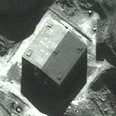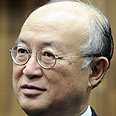It was the first time the International Atomic Energy Agency lent public support to Western suspicions that Israel's target was a nascent nuclear reactor that Washington said was North Korean in design and geared to making weapons-grade plutonium.
Previous IAEA reports on its two-year investigation into the affair, impeded by a lack of Syrian cooperation, said only that the uranium particles raised concern because they did not come from Syria's declared inventory.
"The presence of such particles points to the possibility of nuclear-related activities at the site and adds to questions concerning the nature of the destroyed building," said the confidential report by new IAEA Director-General Yukiya Amano, obtained by Reuters.
"Syria has yet to provide a satisfactory explanation for the origin and presence of these particles," he wrote, dismissing Damascus's contention that the traces came with munitions used by Israel to wreck the complex.
In what analysts called another departure from predecessor Mohamed ElBaradei, Amano prodded Syria to adopt the IAEA's Additional Protocol, which permits unfettered inspections beyond declared nuclear site to ferret out any covert atomic activity.
Syrian stonewall
UN inspectors examined the site at Dair Alzour in June 2008 but Syria has barred renewed access and also not let them visit three military sites, whose appearance was altered by landscaping after the IAEA first asked to check them.
The Vienna-based IAEA has also been checking whether there could be a link between the particles uncovered at Dair Alzour and similar unexplained traces detected in swipe samples taken at a Damascus nuclear research reactor later in 2008.
The report said Syria had refused a meeting in Damascus last month to address the issue. But inspectors now planned to visit the research reactor on February 23 to take more test samples and examine "relevant source documents related to the experiments."
Some analysts say the Damascus findings raised the question whether Syria used some natural uranium intended for the alleged reactor at Dair Alzour in tests applicable to learning how to separate out bomb-grade plutonium from spent nuclear fuel.
Syria, an ally of Iran which is under IAEA investigation over nuclear proliferation suspicions, has denied ever having an atom bomb program and has said the intelligence is fabricated.
"Syria has not cooperated with the agency since June 2008 in connection with the unresolved issues related to the Dair Alzour site and the other three locations allegedly functionally related to it," said the UN watchdog report.
"As a consequence, the Agency has not been able to make progress toward resolving the outstanding issues."
The issue, along with the IAEA's hardening concern about a possible covert Iranian nuclear weapons program, will be on the agenda of the first of four quarterly meetings by the IAEA's 35-nation board of governors starting on March 1.

















